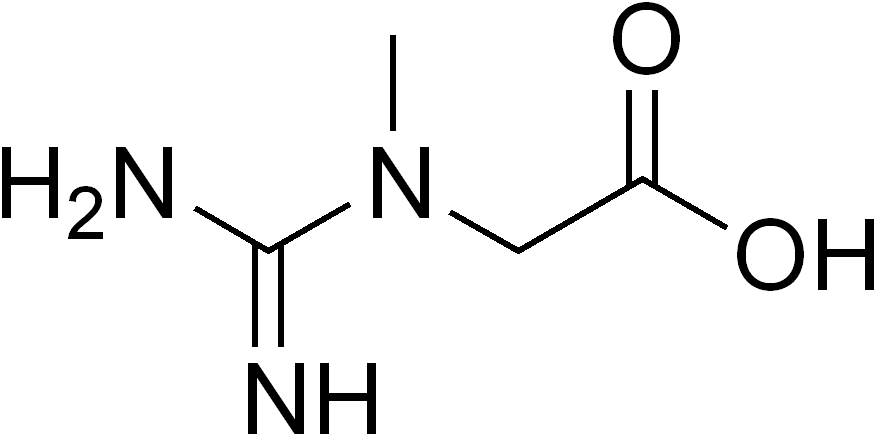Creatine occurs naturally in skeletal muscles and helps supply energy to muscle and nerve cells. Without creatine, we would not be able to perform muscle contractions required to generate effective power. Early in the twentieth century, scientists discovered that consuming supplemental forms of creatine increased the creatine stores in muscles, thereby providing a crucial energy source for explosive muscular movements – like those involved in weight training and sports. It is now widely agreed up that creatine is one the better nutritional supplements, that increases muscle energy which in turn helps increase strength and muscle mass.

Though the market is full of fancy creatines, many of which include other helpful ergogenics, pure creatine monohydrate remains one of the cheapest, most effective and most researched forms of creatine. Creatine monohydrate is simply creatine with an attached molecule of water. Creatine prices have come down a lot over the last few years and I therefore recommend using a creatine monohydrate manufactured by Creapure.
Creapure is a German company that produces one of the purest creatines available. I know of four creatine brands that use Creapure creatine monohydrate:
- Prolab Creatine Monohydrate
- AllMax Micronized Creatine Monohydrate
- Optimum Nutrition Micronized Creatine
- SportPharma Just-Creatine
Regardless of what it says on the label, creatine loading is not required. Studies show that the body’s creatine stores are usually saturated within 30 days using a dose of 1 gram of creatine per 40 pounds of bodyweight. Creatine can be taken first thing in the morning on non-workout days and either pre-workout or post-workout on days that you are exercising. Supplementing with creatine monohydrate while ensuring a sound diet and exercise regimen should result in increased muscle mass, strength gains, harder muscles and in many cases, reduced body fat. Some recent studies have also shown that creatine may have positive effects on the brain and could be useful in treating/preventing neurological and neuromuscular diseases.
Creatine monohydrate research
Long-term creatine supplementation does not significantly affect clinical markers of health in athletes.
Kreider RB, Melton C, Rasmussen CJ, Greenwood M, Lancaster S, Cantler EC, Milnor P, Almada AL.
Exercise and Sport Nutrition Laboratory, Department of Human Movement Sciences and Education, The University of Memphis, Memphis, TN, USA. Richard_Kreider @ baylor.edu
Creatine has been reported to be an effective ergogenic aid for athletes. However, concerns have been raised regarding the long-term safety of creatine supplementation. This study examined the effects of long-term creatine supplementation on a 69-item panel of serum, whole blood, and urinary markers of clinical health status in athletes. Over a 21-month period, 98 Division IA college football players were administered in an open label manner creatine or non-creatine containing supplements following training sessions.
Subjects who ingested creatine were administered 15.75 g/day of creatine monohydrate for 5 days and an average of 5 g/day thereafter in 5-10 g/day doses. Fasting blood and 24-h urine samples were collected at 0, 1, 1.5, 4, 6, 10, 12, 17, and 21 months of training. A comprehensive quantitative clinical chemistry panel was determined on serum and whole blood samples (metabolic markers, muscle and liver enzymes, electrolytes, lipid profiles, hematological markers, and lymphocytes). In addition, urine samples were quantitatively and qualitative analyzed to assess clinical status and renal function.
At the end of the study, subjects were categorized into groups that did not take creatine (n = 44) and subjects who took creatine for 0-6 months (mean 4.4 +/- 1.8 months, n = 12), 7-12 months (mean 9.3 +/- 2.0 months, n = 25), and 12-21 months (mean 19.3 +/- 2.4 months, n = 17). Baseline and the subjects’ final blood and urine samples were analyzed by MANOVA and 2 x 2 repeated measures ANOVA univariate tests. MANOVA revealed no significant differences (p = 0.51) among groups in the 54-item panel of quantitative blood and urine markers assessed. Univariate analysis revealed no clinically significant interactions among groups in markers of clinical status. In addition, no apparent differences were observed among groups in the 15-item panel of qualitative urine markers.
Results indicate that long-term creatine supplementation (up to 21-months) does not appear to adversely effect markers of health status in athletes undergoing intense training in comparison to athletes who do not take creatine.